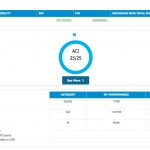The most recent Merit-Based Incentive Payment System (MIPS) reporting season included a new option for rheumatology providers for the first time since the MIPS program launched in 2017: the Advancing Rheumatology Patient Care MIPS Value Pathway (MVP). The MVP was developed to provide a specialty-specific reporting pathway focused on the measures and activities most relevant to rheumatology providers and patient care across all four reporting categories—quality, improvement activities, promoting interoperability and cost—while still providing a streamlined Quality Payment Program (QPP) reporting experience.
The introduction of the new MVP options reflects the move by the Centers for Medicare & Medicaid Services (CMS) toward value-based payment programs. The MVP shares many elements with the traditional MIPS, such as the performance categories, but differs in key points that aim to reduce provider burden. For example, it requires reporting of a lower number of quality measures from a more condensed catalog than traditional MIPS.
“When the rheumatology MVP was first developed, we worked closely with the CMS to fill in the structure with pieces most relevant to our rheumatology providers, especially for quality measures,” says Tracy Johansson, MS, senior director of the ACR’s RISE registry. “The ACR’s quality measures are developed by rheumatology professionals with their workflows and everyday experiences in mind. And given those measures are available through the ACR’s RISE registry, all the data needed to calculate those measures are pulled directly from the electronic health record [EHR] systems of participating practices, making reporting and performing well that much easier.”
To better understand providers’ 2023 MVP reporting experience, the RISE registry sent a comprehensive survey to all practices that reported for the Advancing Rheumatology Patient Care MVP through RISE. This survey captured information on the reporting process, levels of customer support satisfaction and reporting intentions for 2024. Of the 22 practices that used the MVP reporting option through RISE for 2023, nine completed the survey, a 41% response rate. Here are the main findings:
Finding 1: The Process Wasn’t New
Survey respondents unanimously indicated the reporting process for the MVP was nearly identical to that for the traditional MIPS—for better or worse.
“Reporting for MIPS or reporting for MVP is almost the same process,” says Carol Rendon, office manager of the Denver Arthritis Clinic. “The process is just stressful!”
“Reporting for MIPS is by no means a simple process,” says Ms. Johansson. For practices that choose to report only the MVP, the smaller number of required quality measures reduces some of the administrative burden, but the reporting requirements for the other categories remain the same, she notes. “The good news is those who have reported for MIPS in the past will recognize the reporting process and be able to navigate it better, and of course RISE staff are available to help answer any questions that may come up.”
Finding 2: Satisfaction Levels Were “Satisfied” or Above
On a scale of 1–5, with 1 being “very dissatisfied” and 5 being “very satisfied,” all categories received a minimum average score of 3, or “satisfied.”
“We were pleased with the reporting process for the MVP,” says Ms. Rendon. “Last year, to report for MIPS, I had to handle individual spreadsheets for each physician. It changed this year and was much easier.”
“We are beyond pleased to see the RISE customer support and dashboard rated so highly,” says Ms. Johansson. “The RISE team is here to help rheumatology practices navigate a complicated, but important, federal program. And while there is always room for improvement, it is reassuring to see that our efforts are making a difference.”
Even more encouraging is that the question ‘Would you recommend reporting the MVP to a colleague?’ had a total score of 4.33, as well as 89% of respondents saying they intend to submit for the 2024 MVP through RISE.
Finding 3: Users Identified Areas for Improvement
When asked if they found any drawbacks in reporting the 2023 MVP through RISE, two survey respondents shared key feedback regarding the dashboard and quality measure structure.
“We don’t see discrepancies in our dashboard too often,” explains Ms. Rendon. “However, it can take time for those issues to be fixed.”
“It’s important for us to hear where we are not meeting our users’ needs,” Ms. Johansson says. “Feedback like this is incredibly useful as we make our plans for the upcoming reporting season. We are trying to be more proactive with practices so any issues can be identified early in the reporting season. Then we can address the issue as quickly as possible and give the practice and/or clinician more time to course correct before the end of the performance year.”
Finding 4: Recommendations Can Inform Comments to the CMS
The survey also asked for recommendations for the MVP moving forward. Two respondents provided input regarding the measures available in the MVP, with one asking for more measures to be included and the other asking for measures with less administrative burden.
“I think CMS should understand that the whole process is stressful, whether reporting for MIPS or MVP,” says Ms. Rendon. “What we submit could jeopardize our physicians’ payments in the next year. Nine percent may seem small, but it’s a huge amount if we fall in the negative.”
“Although the issues raised are outside of our direct control, we are using every channel we have available to advocate for these issues with the CMS, such as including this feedback in our upcoming comments in response to CMS’ recently released 2025 Proposed Rule,” says Ms. Johansson. “We recognize the important role we play in serving as a strong voice for our practices when it comes to the federal government’s payment programs.”
Finding 5: 89% Plan to Report the 2024 MVP Through RISE
When asked about 2024 reporting plans, 89% stated they intend to submit for the MVP. The other 11% indicated they were unsure of their reporting plans for 2024. Additionally, 44% of survey respondents intend to only report for the 2024 MVP and not traditional MIPS.
“My practice plans to only report for the 2024 MVP and not for traditional MIPS,” explains Ms. Rendon. “Because it is the way CMS is heading, we might as well get ahead and know what it is all about.”
“We at RISE find those numbers really encouraging,” Ms. Johansson says. “Although the first year of anything inherently means paving the way to a certain extent, we are glad providers are finding the MVP we helped CMS build meets their needs so far and look forward to supporting the MVP again for 2024 QPP reporting.”
Conclusion
Although the inaugural year for the MVP had its ups and downs, the survey data indicate providers who reported through RISE had an overall positive experience. They also identified clear pathways for improvement.
“The survey data are instrumental in guiding RISE as we support our users through QPP reporting,” Ms. Johansson says. “Not only will we use it to directly address challenges from this year’s reporting, but we are better able to reflect the opinions of our users to CMS and the federal government at large.”
Want to learn more about the 2023 MVP reporting experience? Email the RISE team at [email protected].
Allison Plitman, MPA, is the senior communications specialist for the ACR’s RISE registry.


